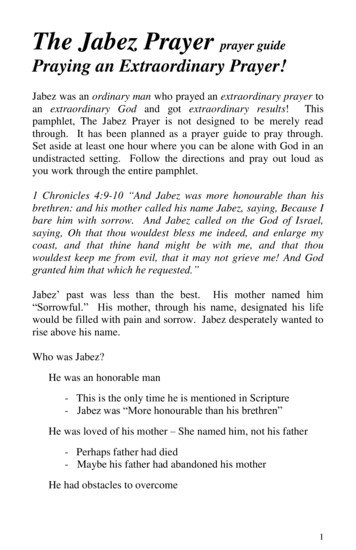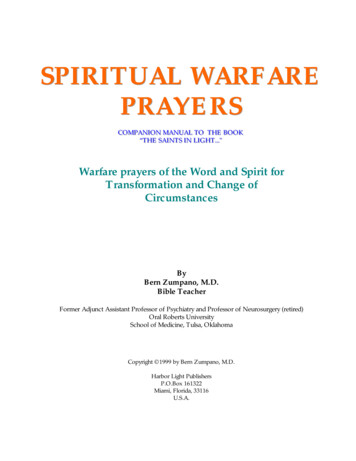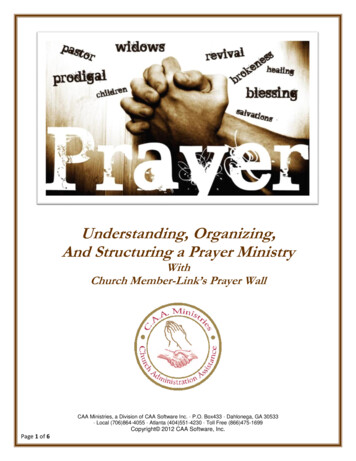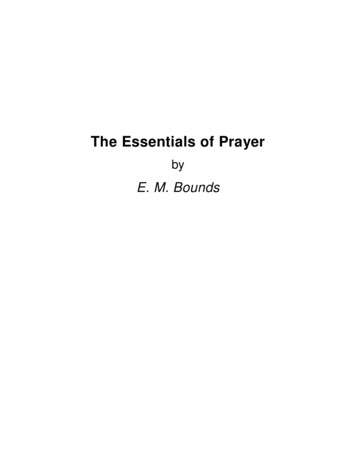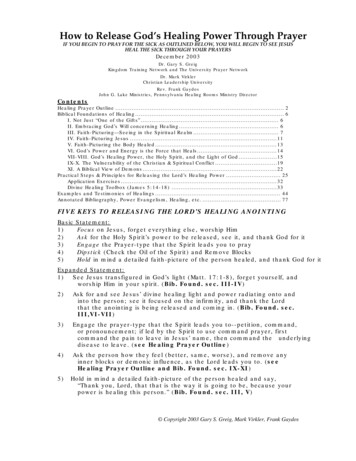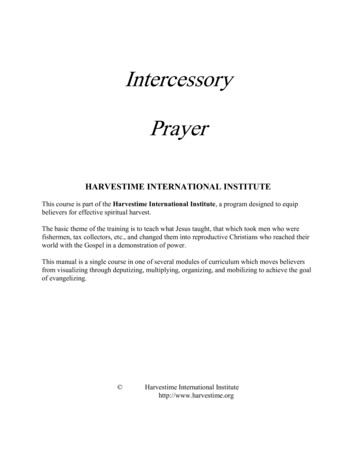
Transcription
IntercessoryPrayerHARVESTIME INTERNATIONAL INSTITUTEThis course is part of the Harvestime International Institute, a program designed to equipbelievers for effective spiritual harvest.The basic theme of the training is to teach what Jesus taught, that which took men who werefishermen, tax collectors, etc., and changed them into reproductive Christians who reached theirworld with the Gospel in a demonstration of power.This manual is a single course in one of several modules of curriculum which moves believersfrom visualizing through deputizing, multiplying, organizing, and mobilizing to achieve the goalof evangelizing. Harvestime International Institutehttp://www.harvestime.org
TABLE OF CONTENTSPAGEHow To Use This Manual.ISuggestions For Group Study .IICourse Introduction.1Course Objectives.21.An Introduction To Prayer.32.Intercessory Prayer.103.Spiritual Resources For Intercession .164.How To Intercede.295.Hindrances To Effective Intercession .406.Using The Model Prayer To Intercede.447.Interceding For Revival.568.Getting Started And Keeping Going .70.80Appendix Two: Study Guide: Biblical Intercession .92Answers To Self-Tests.Appendix One: Index Of Prayers In The Bible.93
HOW TO USE THIS MANUALMANUAL FORMATEach lesson consists of:Objectives: These are the goals you should achieve by studying the chapter. Read them beforestarting the lesson.Key Verse: This verse emphasizes the main concept of the chapter. Memorize it.Chapter Content: Study each section. Use your Bible to look up any references not printed inthe manual.Self-Test: Take this test after you finish studying the chapter. Try to answer the questionswithout using your Bible or this manual. When you have concluded the Self-Test, check youranswers in the answer section provided at the end of the book.For Further Study: This section will help you continue your study of the Word of God, improveyour study skills, and apply what you have learned to your life and ministry.Final Examination: If you are enrolled in this course for credit, you received a final examinationalong with this course. Upon conclusion of this course, you should complete this examinationand return it for grading as instructed.ADDITIONAL MATERIALS NEEDEDYou will need a King James version of the Bible.I
SUGGESTIONS FOR GROUP STUDYFIRST MEETINGOpening: Open with prayer and introductions. Get acquainted and register the students.Establish Group Procedures: Determine who will lead the meetings, the time, place, and datesfor the sessions.Praise And Worship: Invite the presence of the Holy Spirit into your training session.Distribute Manuals To Students: Introduce the manual title, format, and course objectivesprovided in the first few pages of the manual.Make The First Assignment: Students will read the chapters assigned and take the Self-Testsprior to the next meeting. The number of chapters you cover per meeting will depend on chapterlength, content, and the abilities of your group.SECOND AND FOLLOWING MEETINGSOpening: Pray. Welcome and register any new students and give them a manual. Takeattendance. Have a time of praise and worship.Review: Present a brief summary of what you studied at the last meeting.Lesson: Discuss each section of the chapter using the HEADINGS IN CAPITAL BOLDFACED LETTERS as a teaching outline. Ask students for questions or comments on what theyhave studied. Apply the lesson to the lives and ministries of your students.Self-Test: Review the Self-Tests students have completed. (Note: If you do not want thestudents to have access to the answers to the Self-Tests, you may remove the answer pages fromthe back of each manual.)For Further Study: You may do these projects on a group or individual basis.Final Examination: If your group is enrolled in this course for credit, you received a finalexamination with this course. Reproduce a copy for each student and administer the exam uponconclusion of this course.II
INTRODUCTIONYou are about to begin an exciting spiritual adventure. Through the pages of this manual you willlearn about a powerful supernatural resource available to the Body of Christ, that of intercessoryprayer.In this study you will learn what intercessory prayer is and how to do it effectively using dynamicspiritual resources that have been delegated for this purpose. You will learn what to pray for, howto overcome hindrances to intercessory prayer, and how to get started and keep going.Your spiritual life and ministry will never again be the same. Are you ready to begin your journeyto this exciting spiritual destination?There is a place where thou canst touch the eyesOf blinded men to instant perfect sight;There is a place where thou canst say, "Arise!"To dying captives, bound in chains of night.There is a place where thou cast reach the storeOf hoarded gold and free it for the Lord;There is a place upon some distant shoreWhere thou canst send the worker and the Word;There is a place where heaven's resistant powerResponsive moves to thine insistent plea;There is a place-a silent trysting hourWhere God Himself descends and fights for thee.Where is that secret place? Dost thou ask where?O soul, it is the secret place of prayer!-Author Unknown1
COURSE OBJECTIVESUpon conclusion of this course you will be able to: Define prayer.Explain how prayer is answered.Summarize the role of prayer in the life of Jesus Christ.Identify the levels of prayer.Identify the different types of prayer.Define intercessory prayer.Explain the Biblical basis of the believer's ministry as an intercessor.Identify Jesus Christ as our model for intercession.Describe how intercession is done.Explain why intercession is important.Use spiritual resources for intercession, including delegated power and authority, bindingand loosing, the Name of Jesus, the blood of Jesus, and fasting.Explain how to intercede.Summarize principles for effective intercession.Identify what to intercede for.Use the promises of God to intercede.Identify and eliminate hindrances to effective intercession.Know when not to pray.Provide Scriptural references for the model prayer.Explain why the Lord's prayer is actually a prayer of intercession.Recite the model prayer from memory.Use the model prayer as a guide for intercession.Define revival.Explain how we can prepare for revival.Recognize when revival is needed.Identify evidences of a backslidden condition.Summarize Biblical principles of revival.Identify obstacles to revival.Explain how to use "God's revival plan" to intercede for revival.Make a plan for organized prayer.Create a personal prayer manual.Engage in international intercession.Identify problems and solutions for getting started and keeping going.Commit yourself to the ministry of intercession.2
CHAPTER ONEAN INTRODUCTION TO PRAYEROBJECTIVES:Upon completion of this chapter you will be able to: Define prayer.Explain how prayer is answered.Summarize the role of prayer in the life of Jesus Christ.Identify the levels of prayer.Identify the different types of prayer.KEY VERSES:Ask, and it shall be given you; seek, and ye shall find; knock, and it shall beopened unto you:For every one that asketh receiveth; and he that seeketh findeth, and to himthat knocketh it shall be opened. (Matthew 7:7-8)INTRODUCTIONThis chapter introduces the subject of prayer. You will learn the definition of prayer and theimportance Jesus placed on it. You will learn how prayer is answered and the different levels andtypes of prayer.THE DEFINITION OF PRAYERPrayer is communicating with God. It takes different forms, but basically it occurs when mantalks with God and God talks with man. Prayer is described as:Calling upon the name of the Lord:Crying unto God:Drawing near to God:Looking up:Lifting up the soul:Lifting up the heart:Pouring out the heart:Pouring out the soul:Crying to Heaven:Beseeching the Lord:Genesis 12:8Psalms 27:7; 34:6Psalms 73:28; Hebrews 10:22Psalms 5:3Psalms 25:1Lamentations 3:41Psalms 62:8I Samuel 1:15II Chronicles 32:20Exodus 32:113
Seeking God:Seeking the face of the Lord:Making supplication:Job 8:5Psalms 27:8Job 8:5; Jeremiah 36:7Prayer is not just talking to God, but it involves listening also. Prayer is communication, and aone-way conversation does not last long. When you pray, expect God to speak to you. Mostoften He will do this through His written Word or by a "still small voice" that seems to "speak"to your heart. Sometimes He will give you a vision or interpret back to your spirit what you haveprayed in your heavenly prayer language.Don't just rush in and dump all your requests on God and then end your prayer. Allow time forHim to speak to you. He will give answers to your questions, guidance for the day ahead, andhelp you order your priorities. Sometimes He will give you a special message of encouragementto share with someone for whom you are interceding.When you pray, there is no one approved posture for prayer. You may pray while:Standing:Bowing down:Kneeling:Falling on your face:Spreading out your hands:Lifting up the hands:I Kings 8:22; Mark 11:25Psalms 95:6II Chronicles 6:13; Psalms 95:6; Luke 22:41;Acts 20:36Numbers 16:22; Joshua 5:14; I Chronicles 21:16;Matthew 26:39Isaiah 1:15; II Chronicles 6:13Psalms 28:2; Lamentations 2:19; I Timothy 2:8HOW PRAYER IS ANSWEREDThe Bible reveals that prayer is answered:Immediately at times:Delayed at times:Different from our desires:Beyond our expectations:Isaiah 65:24; Daniel 9:21-23Luke 18:7II Corinthians 12:8-9Jeremiah 33:3; Ephesians 3:20THE PRAYER LIFE OF JESUSPrayer should be important to us because it was important to the Lord Jesus. Jesus is our greatestmodel of intercessory prayer. Study each of the following references about the prayer life ofJesus:4
JESUS MADE PRAYER A PRIORITY:-He prayed any time of the day or night:-Prayer took priority over eating:-Prayer took priority over business:-He taught prayer to his disciples:Luke 6:12-13John 4:31-32John 4:31-32Matthew 6:9-13PRAYER ACCOMPANIED ANY EVENT OF IMPORTANCE IN HIS LIFE:-At His baptism:-During the first ministry tour:-Before the choice of the disciples:-Before/after feeding the 5,000:Luke 3:21-22Mark 1:35; Luke 5:16Luke 6:12-13Matthew 14:19,23; Mark 6:41,46;John 6:11,14-15Matthew 15:36; Mark 8:6,7Luke 9:20Luke 9:28,29Matthew 11:25; Luke 10:21John 11:41-42Matthew 19:13John 12:27-28Luke 22:32John 14:16Luke 24:30-31Luke 24:50-53John 17Matthew 26:26-27;Mark 14:22-23; Luke 22:17-19-At the feeding of the 4,000:-Before the confession of Peter:-Before the transfiguration:-At the return of the seventy:-At the grave of Lazarus:-At the blessing of the children:-At the coming of certain Greeks:-For Peter:-For the giving of the Holy Spirit:-On the road to Emmaus:-Prior to His ascension:-For His followers:-Before His greatest trial:LEVELS OF PRAYERThere are three levels of intensity in prayer: Asking, seeking, and knocking:Ask, and it shall be given you; seek, and ye shall find; knock, and it shall beopened unto you:For every one that asketh receiveth; and he that seeketh findeth, and to himthat knocketh it shall be opened. (Matthew 7:7-8)Asking is the first level of prayer. It is simply presenting a request to God and receiving animmediate answer. In order to receive, the condition is to ask:.ye have not, because ye ask not. (James 4:2)5
Seeking is a deeper level of prayer. This is the level of prayer where answers are not asimmediate as at the asking level. The 120 gathered in the upper room where they continued inprayer is an example of seeking. These men and women sought fulfillment of the promise of theHoly Spirit and continued seeking until the answer came (Acts 1-2).Knocking is a deeper level. It is prayer that is persistent when answers are longer in coming. It isillustrated by the parable Jesus told in Luke 11:5-10. It is also illustrated by the persistence ofDaniel who continued to "knock" despite the fact he saw no visible results because Satanhindered the answer from God (Daniel 10).TYPES OF PRAYERPaul calls for believers to pray always with "all prayer" (Ephesians 6:18). Another translation ofthe Bible reads "praying with every kind of prayer" (Goodspeed Translation). This refers to thevarious types of prayer which include:1. WORSHIP AND PRAISE:You enter into God's presence with worship and praise:Enter into His gates with thanksgiving, and into His courts with praise; bethankful unto Him, and bless His Name. (Psalms 100:4)Worship is the giving of honor and devotion. Praise is thanksgiving and an expression ofgratitude not only for what God has done but for who He is. You are to worship God in spiritand in truth:But the hour cometh, and now is, when the true worshipers shall worship theFather in Spirit and in truth: for the Father seeketh such to worship Him.God is a Spirit, and they that worship Him must worship Him in spirit and intruth. (John 4:23-24)Worshiping God in truth means that you worship Him on the basis of what is revealed in theWord of God. To worship Him in Spirit is to do so sincerely in the power of the Holy Spirit,from your innermost being, putting Him first above all others. When you worship in Spirit, youallow the Holy Spirit to direct your worship. You do not use man-made formulas or rituals ofworship. You do not just repeat chants or prayers with your mind somewhere else.Instead, you open up the innermost recesses of your heart and mind, and lift praise and adorationto Him in your own words. Sometimes, the Holy Spirit will take over completely and you willbegin to worship in the "other tongues" of your prayer language.6
Praise and worship can be with:Singing:Audible praise:Shouting:Lifting up of the hands:Clapping:Musical instruments:Standing:Bowing:Dancing:Kneeling:Lying down:Psalms 9:2,11; 40:3; Mark 14:26Psalms 103:1Psalms 47:1Psalms 63:4; 134:2; I Timothy 2:8Psalms 47:1Psalms 150:3-5II Chronicles 20:19Psalms 95:6Psalms 149:3Psalms 95:6Psalms 149:52. COMMITMENT:This is prayer committing your life and will to God. It includes prayers of consecration anddedication to God, His work, and His purposes.3. PETITION:Prayers of petition are requests. Requests must be made according to the will of God asrevealed in His written Word. Petitions may be at the levels of asking, seeking, or knocking.Supplication is another word for this type of prayer. The word supplication means "beseechingGod or strongly appealing to Him in behalf of a need.4. CONFESSION AND REPENTANCE:A prayer of confession is repenting and asking forgiveness for sin:If we confess our sins, He is faithful and just to forgive us our sins and tocleanse us from all unrighteousness. (I John 1:9)5. INTERCESSION:Intercession is prayer for others. An intercessor is one who takes the place of another or pleadsanother's case. It is upon this type of prayer that the remainder of this manual focuses.7
SELF-TEST1.Write the Key Verse from memory.2.Define prayer.3.Explain how prayer is answered.4.Summarize the role of prayer in the life of Jesus Christ.5.Identify and define the levels of prayer discussed in this chapter.6.Write a brief synopsis of the five types of prayer discussed in this chapter.(Answers to tests are provided at the conclusion of the final chapter in this manual.)8
FOR FURTHER STUDY1.Here is a prayer guide to help you pray for the continents and the world:On Monday:On Tuesday:On Wednesday:On Thursday:On Friday:On Saturday:On Sunday:2.Pray for AsiaPray for EuropePray for AfricaPray for North AmericaPray for Latin AmericaPray for Oceania (Island nations)Pray for the entire worldStudy the following Scriptures again and then experiment by praying in differentpositions:Standing:Bowing down:Kneeling:Falling on your face:Spreading out your hands:Lifting up the hands:3.I Kings 8:22; Mark 11:25Psalms 95:6II Chronicles 6:13; Psalms 95:6; Luke 22:41; Acts20:36Numbers 16:22; Joshua 5:14; I Chronicles 21:16;Matthew 26:39Isaiah 1:15; II Chronicles 6:13Psalms 28:2; Lamentations 2:19; I Timothy 2:8Study the following verses again and then experiment by praising and worshiping God inthe various ways Scripture directs:Singing:Audible praise:Shouting:Lifting up of the hands:Clapping:Musical instruments:Standing:Bowing:Dancing:Kneeling:Lying down:Psalms 9:2,11; 40:3; Mark 14:26Psalms 103:1Psalms 47:1Psalms 63:4; 134:2; I Timothy 2:8Psalms 47:1Psalms 150:3-5II Chronicles 20:19Psalms 95:6Psalms 149:3Psalms 95:6Psalms 149:59
CHAPTER TWOINTERCESSORY PRAYEROBJECTIVES:Upon completion of this chapter you will be able to: Define intercessory prayer.Explain the Biblical basis of the believer's ministry as an intercessor.Identify Jesus Christ as our model for intercession.Explain how to intercede.Explain why intercession is important.KEY VERSE:Wherefore He is able also to save them to the uttermost that come unto Godby Him, seeing He ever liveth to make intercession for them.(Hebrews 7:25)INTRODUCTIONIn the last lesson you learned that intercession is praying for others. An intercessor is one whotakes the place of another or pleads another's case. When you pray this way, you areinterceding:"Intercession may be defined as holy, believing, persevering prayer wherebysomeone pleads with God on behalf of another or others who desperately needGod's intervention." (Full Life Bible)It is upon this type of prayer that the remainder of this manual focuses. In this lesson you willlearn the Biblical basis of intercession and about our model for intercession, the Lord JesusChrist. You will also learn how to do intercession and why it is an important ministry.THE BIBLICAL BASIS OF INTERCESSIONThe Biblical basis for the New Testament believer's ministry of intercessory prayer is our callingas priests unto God. The Word of God declares that we are a holy priesthood (I Peter 2:5), aroyal priesthood (I Peter 2:9), and a kingdom of priests (Revelation 1:5).The background for understanding this calling to priestly intercession is found in the OldTestament example of the Levitical priesthood. The priest's responsibility was to stand beforeand between. He stood before God to minister to Him with sacrifices and offerings. Thepriests also stood between a righteous God and sinful man bringing them together at the place of10
the blood sacrifice.Hebrews 7:11-19 explains the difference between the Old and New Testament ministries of thepriest. The Old Testament Levitical priesthood was passed on from generation to generationthrough the descendants of the tribe of Levi. "The Melchizedek priesthood" spoken of in thispassage, is the "new order" of spiritual priests of whom the Lord Jesus is the High Priest. It ispassed on to us through His blood and our spiritual birth as new creatures in Christ.THE MODEL INTERCESSORThe Bible records that God's purpose in sending Jesus was for Him to serve as an intercessor:And He saw that there was no man, and wondered that there was nointercessor: therefore His arm brought salvation unto Him, and Hisrighteousness, it sustained Him. (Isaiah 59:16)Jesus stands before God and between Him and sinful man, just as the Old Testament priests did:For there is one God, and one mediator (intercessor) between God and men,the man Christ Jesus. (I Timothy 2:5).It is Christ that died, yea rather, that is risen again, who is even at the righthand of God, who also maketh intercession for us. (Romans 8:34)Wherefore He is able also to save them to the uttermost that come unto Godby Him, seeing He ever liveth to make intercession for them.(Hebrews 7:25)Jesus brings sinful man and a righteous God together at the place of the blood sacrifice for sin.No longer is the blood of animals necessary as it was in the Old Testament. We can nowapproach God on the basis of the blood of Jesus which was shed on the cross of Calvary for theremission of sins. Because of the blood of Jesus, you can approach God boldly without timidity(Hebrews 4:14-16).Jesus was an intercessor while He was here on earth. He prayed for those who were sick andpossessed by demons. He prayed for His disciples. He even prayed for you when He intercededfor all those who would believe on Him. Jesus continued His ministry of intercession after Hisdeath and resurrection when He returned to Heaven. He now serves as our intercessor in Heaven.11
HOW TO INTERCEDEAs intercessors following the Old Testament priestly function and the New Testament pattern ofJesus, we stand before God and between a righteous God and sinful man. In order to be effectivestanding "between" we must first stand "before" God to develop the intimacy necessary to fulfillthis role.Numbers 14 is one of the greatest accounts of intercessory prayer recorded in the Bible. Moseswas able to stand between God and sinful man because he had stood "before" Him and haddeveloped intimacy. Numbers 12:8 records that God spoke with Moses as friend to friend andnot through visions and dreams as He did with other prophets.As New Testament believers we no longer sacrifice animals as in Old Testament times. Westand before the Lord to offer up spiritual sacrifices of praise (Hebrews 13:5) and the sacrifice ofour own lives (Romans 12:1). It is on the basis of this intimate relationship with God that we canthen stand "between" Him and others, serving as an advocate and intercessor in their behalf.Peter uses two words to describe this priestly ministry: "Holy" and "royal." Holiness is requiredto stand before the Lord (Hebrews 12:14). We are able to do it only on the basis of therighteousness of Christ not our own righteousness. Royalty is descriptive of the kingly authoritywhich is delegated to us as members of the "royal family," so to speak, with legitimate access tothe throne room of God.Sometimes this priestly intercession is done with understanding. This occurs when youintercede for others in your own native language and you understand what you are saying:I exhort therefore, that first of all, supplications, prayers, intercessions, andgiving of thanks, be made for all men.For kings, and for all that are in authority. (I Timothy 2:1-2)At other times, intercession is made by the Holy Spirit. It may be with groanings resulting froma heavy spiritual burden. It may also be in an unknown tongue. When this happens, the HolySpirit speaks through you praying directly to God according to the will of God:Likewise the Spirit also helpeth our infirmities; for we know not what weshould pray for as we ought; but the Spirit itself maketh intercession for uswith groanings which cannot be uttered. (Romans 8:26)For he who speaks in a tongue does not speak to men but to God, for no oneunderstands him; however, in the spirit he speaks mysteries.(I Corinthians 14:2)12
You do not understand this type of intercession with your mind, but it is the deepest level ofintercessory prayer and the most effective because it is made "according to the will of God."Your mind and will do not affect the prayers prayed by the Holy Spirit through you in anunknown tongue.[1]WHY INTERCESSION IS IMPORTANTIntercession is obviously important because of the emphasis Jesus placed on it in His own earthlyministry. Its importance is also revealed in the Biblical record which is filled with the stories ofmen and women who experienced powerful results through effective intercession.Through effective intercession, you can go spiritually anywhere in the world. Your prayers haveno limitations of distance as they can penetrate unreached nations and cross throughgeographical, cultural, and political barriers. You can affect the destiny of individuals and entirenations. You can actually help save lives and souls of men and women, boys and girls and extendthe Gospel of the Kingdom of God around the world as you intercede in prayer.[1] For additional information on speaking in other tongues consult the Harvestime International Institute courseentitled "Ministry Of The Holy Spirit."13
SELF-TEST1.Write the Key Verse from memory.2.Define intercessory prayer.3.Explain the Biblical basis of the believer's ministry as an intercessor.4.Who is our model for intercession?5.Explain how intercession is done.6.Explain why intercession is important.(Answers to tests are provided at the conclusion of the final chapter in this manual.)14
FOR FURTHER STUDYOne of the greatest examples of intercessory prayer is the prayer of Jesus recorded in John 17.Use the following outline to study this prayer:Jesus prays for Himself:John 17:1-5Summarize His requests for Himself:Jesus prays for His immediate disciples:John 17:6-19Summarize His requests for His immediate disciples:Jesus prays for His future disciples:John 17:20-23List the specific requests Jesus makes for His future disciples:Jesus concludes His prayer:John 17:24-26Summarize how Jesus concludes His prayer:What is His specific desire?What did He declare to His followers?What does He want to be "in them"?15
CHAPTER THREESPIRITUAL RESOURCES FOR INTERCESSIONOBJECTIVES:Upon completion of this chapter you will be able to: Identify the spiritual resources for intercession, including:Delegated power and authority.Binding and loosing.The Name of Jesus.The Blood of Jesus.Fasting.Use these spiritual resources in intercession.KEY VERSE:Then He called His twelve disciples together and gave them power andauthority over all devils, and to cure diseases. (Luke 9:1)INTRODUCTIONGod has provided tremendous spiritual resources for this ministry of intercession to which we arecalled. In this lesson you will learn how to use these resources which include delegated powerand authority, binding and loosing, the Name of Jesus, the blood of Jesus and fasting.DELEGATED POWER AND AUTHORITYWhen we intercede in prayer we actually battle with our enemy, Satan, for the souls of men andwomen, boys and girls, for nations, and spiritual and political leaders. We do not do this in ourown ability or strength, but on the basis of the spiritual power and authority delegated to us byJesus:Then He called His twelve disciples together and gave them power andauthority over all devils, and to cure diseases. (Luke 9:1)There is a difference between authority and power. Consider the example of a policeman. He hasa badge and a uniform which are symbols of his authority. His authority comes because of theposition he holds with the government. Since not all people respect that authority, the policemanalso carries a weapon and that weapon is his power. Your authority over the enemy comesthrough Jesus Christ and your position in Him as a believer. Your power over the enemy comes16
through the Holy Spirit:And behold, I send the promise of My Father upon you; but tarry ye in thecity of Jerusalem, until ye be endued with power from on high.(Luke 24:49)Like the policeman, you must have both authority and power to be effective in intercession, foryou are actually doing spiritual battle with Satan. Believers receive authority through the newbirth experience and their position in Christ but some never go on to receive the power of theHoly Spirit which must be combined with authority to intercede effectively.Satan has limited power, but he has no authority. Jesus gave us both power and authority overall the power of the enemy. The power Jesus gave is directed power to be used for specificpurposes in intercession:POWER OVER THE ENEMY:You have authority to intercede in prayer for those who need healing and deliverance:Then He called His twelve disciples together and gave them power andauthority over all devils, and to cure diseases. (Luke 9:1)POWER OVER SIN:You have authority to intercede for those who need salvation:Whosesoever sins ye remit, they are remitted unto them; and whosesoeversins ye retain, they are retained. (John 20:23)POWER TO EXTEND THE GOSPEL:You have authority to pray for laborers to extend the Gospel:Then He said to His disciples, "The harvest truly is plentiful, but the laborersare few. Therefore pray the Lord of the harvest to send out laborers intoHis harvest." (Matthew 9:37)BINDING AND LOOSINGThe term "to bind" originates from the Hebrew word asar meaning "to bind, imprison, tie,gird, to harness." The word occurs approximately 70 times in the Hebrew Old Testament andwas often used to indicate the tying up of horses and donkeys (II Kings 7:10).The remarks of Jesus in Matthew 12:28-29 are of great significance.17
But if I cast out demons by the Spirit of God, surely the kingdom of God hascome upon you.Or else how can one enter a strong man's house and plunder his goods,unless he first binds the strong man? And then he will plunder his house.(Matthew 12:28-29)It is impossible to take the possessions of the strong man without first of all binding the strongman. Jesus, in speaking of the strong man, is referring to Satan. Those possessions which are tobe taken from him are his most prized possessions of all, lost individuals enslaved by him,including those who are "demonized."Jesus gave believers the power to bind and loose:And I will give unto thee the keys of the Kingdom of Heaven; and whatsoeverthou shalt bind on earth shall be bound in Heaven; and whatsoever thoushalt loose on earth shall be loosed in Heaven.(Matthew 16:19)Jesus taught the importance of binding evil spirits before casting them out, but the principle ofbinding and loosing extends to more than casting out demons. You can bind the power of theenemy to work in your life, home, community, and church fellowship. You can loose men andwomen from the bondage of sin, depression, and discouragement of the enemy. In everysituation.every problem, every challenge.there is a spiritual key. That key is binding andloosing through intercessory prayer.THE NAME OF JESUSThe Name of Jesus is the authority upon which we intercede. Jesus promised:If ye shall ask any thing in my name, I will do it. (John 14:14).Verily, verily, I say unto you, Whatsoever ye shall ask the Father in myname, He will give it you. (John 16:23)And these signs shall fo
Identify Jesus Christ as our model for intercession. Describe how intercession is done. Explain why intercession is important. Use spiritual resources for intercession, including delegated power and authority, binding and loosing, the Name of Jesus, the blood

